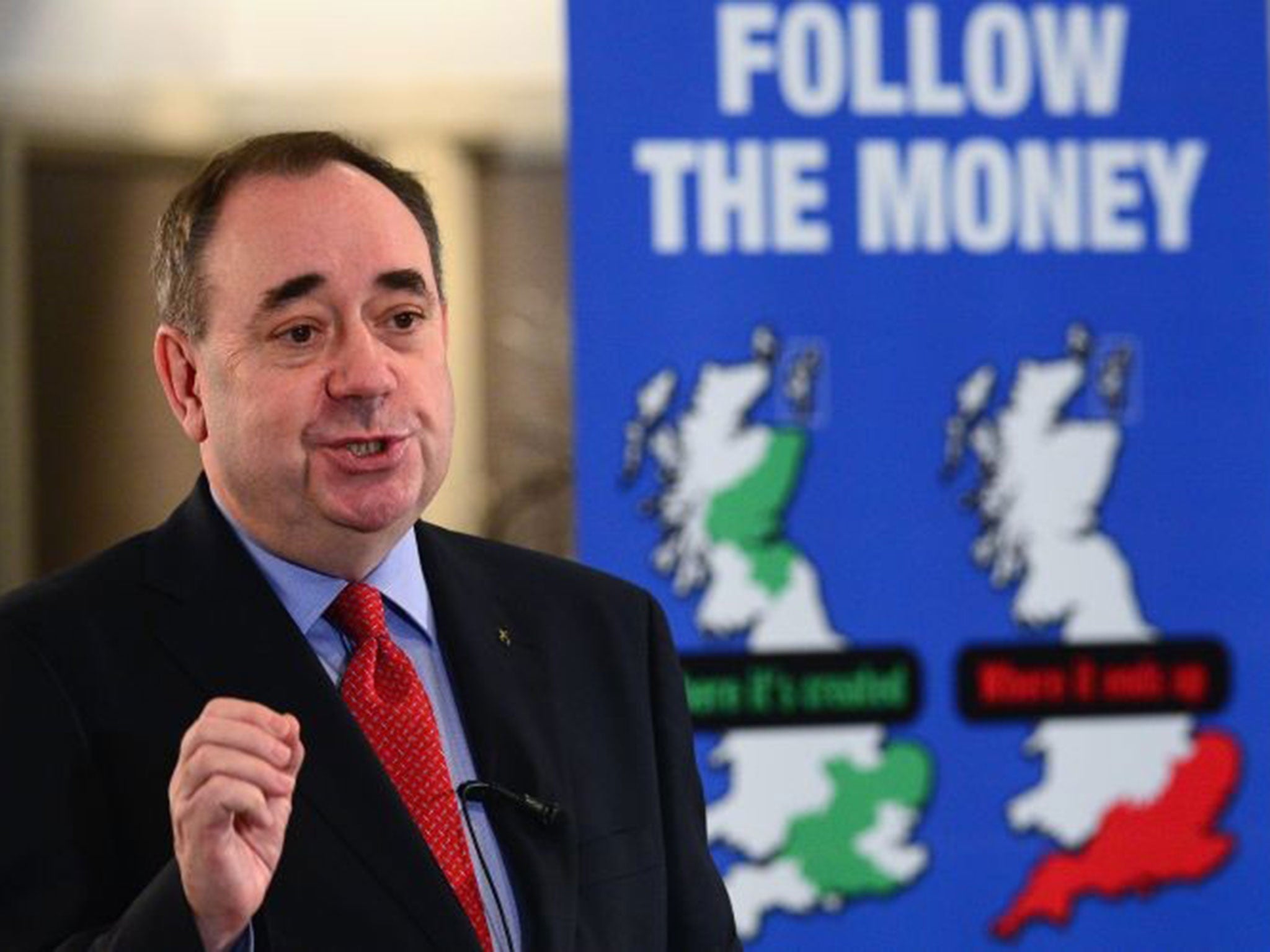Scottish independence: Alex Salmond hits out at George Osborne over 'ill-informed' comments in row over keeping the pound
First Minister describes attacks by Westminster and Brussels as 'attempts to dictate from on high' what Scotland can and cannot do

Your support helps us to tell the story
From reproductive rights to climate change to Big Tech, The Independent is on the ground when the story is developing. Whether it's investigating the financials of Elon Musk's pro-Trump PAC or producing our latest documentary, 'The A Word', which shines a light on the American women fighting for reproductive rights, we know how important it is to parse out the facts from the messaging.
At such a critical moment in US history, we need reporters on the ground. Your donation allows us to keep sending journalists to speak to both sides of the story.
The Independent is trusted by Americans across the entire political spectrum. And unlike many other quality news outlets, we choose not to lock Americans out of our reporting and analysis with paywalls. We believe quality journalism should be available to everyone, paid for by those who can afford it.
Your support makes all the difference.Alex Salmond and his deputy Nicola Sturgeon mounted a joint salvage operation today to try and rescue two key planks of the Scottish independence campaign.
Following sustained attacks by London and Brussels on the nationalists’ assurances that Scotland would retain the pound and be granted continuing EU membership, the First Minister said the “ill-informed” comments made by George Osborne in Edinburgh last week had “back-fired”. He claimed it would impossible for the Treasury to sell a “George tax” that would add £500m a year to English businesses in transaction costs with Scotland.
Ms Sturgeon, speaking to the BBC just before Mr Salmond addressed a group of pro-independence business leaders in Aberdeen, rejected the warning on Sunday from the European Commission president, Jose Manuel Barroso, that it would be “extremely difficult, if not impossible” for an independent Scotland to be granted EU membership.
The deputy first minister said no EU state had indicated they would veto Scotland as a full member. She insisted that such action was against the founding principles of the EU, and denied that EU membership would come with a linked demand that Scotland adopt the euro.
The stark question marks now hanging over an independent Scotland’s currency and whether or not it would be left stuck in a long queue for EU membership are seen by the ‘Yes’ campaign as potentially damaging issues than cannot be allowed to drift between now and the September 18 referendum.
Left with little choice but to go on the offensive, Mr Salmond described the attacks by Westminster and Brussels as “attempts to dictate from on high” what Scotland can and cannot do.
In response, he hinted that the “Yes we can” slogan adopted by Barack Obama in the 2008 US presidential race, could soon be recycled in Scotland.
He told the Aberdeen audience that the chancellor had not offered an economic assessment of Scotland forming a currency union with England, but had instead indulged simply in a “campaign tactic”. He forecast that this would “differ greatly from the reality of life” once the referendum votes were counted.
The leader of the ‘No’ campaign, Alistair Darling, accused Mr Salmond of “pretending the last week [of attacks] never happened”. The former chancellor said: “The wheels are now falling off the independence wagon” and added that Mr Salmond now had a duty to tell those voting on independence what would replace the pound.
The Chief Secretary to the Treasury, Danny Alexander, said the SNP were now left advocating leaving the union without a precise political map and without a destination. He said it “beggars belief” that Mr Salmond had “no plan B” and was continuing to hide the uncertainty over the issue of Scotland’s future currency.
Although Mr Salmond said he believed the EU would find a “pragmatic way” to accommodate Scotland’s membership and that “democratic logic” would prevail, he offered no parallel optimism for the negotiations with the UK government that would follow a majority Yes vote in September.
In Aberdeen he repeated the threat that if Scotland was denied a share of the pound and the Bank of England, then there would no legal obligation for Scotland accepting a share of the UK’s £1.25 trillion national debt.
Regardless of this threat, negotiations between Whitehall and Holyrood on the carve up of UK debt are still expected to dominate the immediate 18 month timeframe after a Yes campaign triumph. Ms Sturgeon also told the BBC that parallel talks with the EU, ending in Scotland joining the EU, would also be concluded within the same time period.
However Sir David Edward, a former judge of European Court of Justice between 1992 and 2004, has openly questioned such certainty.
Other legal advice to the UK government, which has been shared with Holyrood, has also expressed the difficulties of separation.
Sir David said that in the 18 month period after September “there is no entity called Scotland that can negotiate with the EU” and that it was “grossly optimistic” to suggest negotiations with Brussels could be concluded before March 2016.
Join our commenting forum
Join thought-provoking conversations, follow other Independent readers and see their replies
Comments